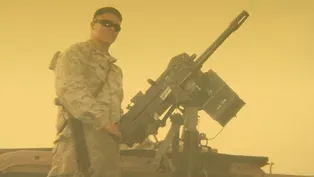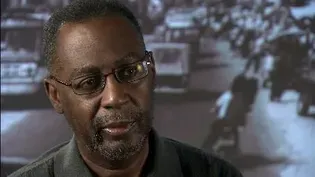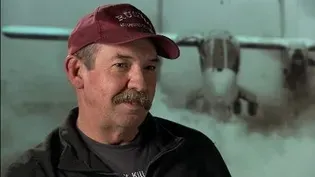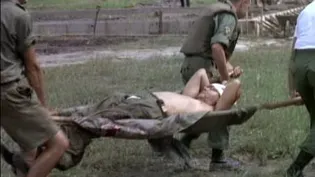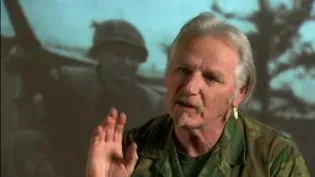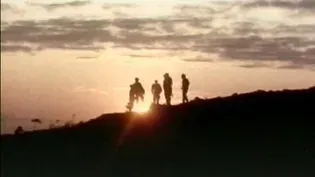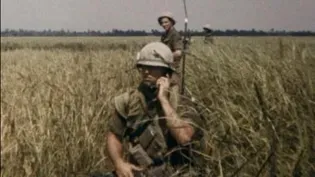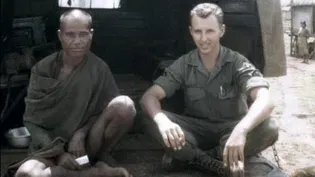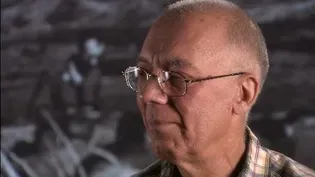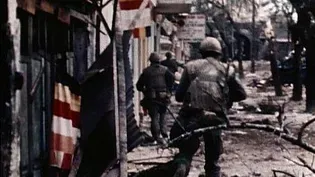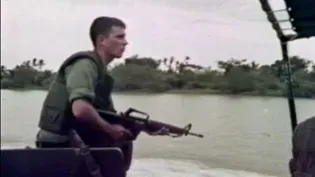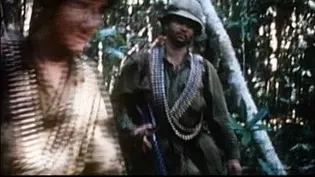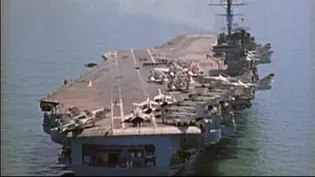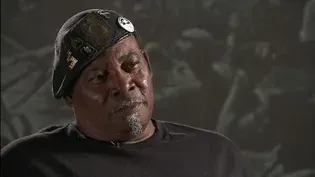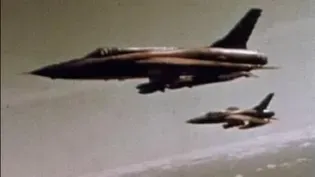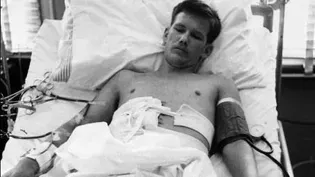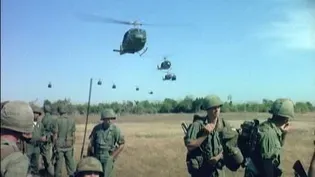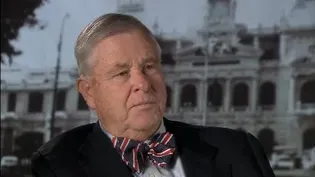
Vietnam: Turning Point - TET 1968
Clip | 8m 13sVideo has Closed Captions
The Tet Offensive shocked both soldiers and the American public.
Vietnamese New Year Wisconsin veterans describe the Tet Offensive, the largest military operation up to that point of the war. The attack shocked both soldiers and the American public due to previous beliefs that the enemy was incapable of such an effort of massive military force. (Part 4/7)
Problems with Closed Captions? Closed Captioning Feedback
Problems with Closed Captions? Closed Captioning Feedback
Wisconsin War Stories is a local public television program presented by PBS Wisconsin
Thanks to lead gifts from Don and Roxanne Weber, Associated Bank, Ho Chunk Nation and the Lynde and Harry Bradley Foundation.

Vietnam: Turning Point - TET 1968
Clip | 8m 13sVideo has Closed Captions
Vietnamese New Year Wisconsin veterans describe the Tet Offensive, the largest military operation up to that point of the war. The attack shocked both soldiers and the American public due to previous beliefs that the enemy was incapable of such an effort of massive military force. (Part 4/7)
Problems with Closed Captions? Closed Captioning Feedback
How to Watch Wisconsin War Stories
Wisconsin War Stories is available to stream on pbs.org and the free PBS App, available on iPhone, Apple TV, Android TV, Android smartphones, Amazon Fire TV, Amazon Fire Tablet, Roku, Samsung Smart TV, and Vizio.
[solemn music] - Roger Treece: I was assigned to Fleet Air Reconnaissance Squadron 1 at a top-secret crypto clearance.
And that's just about as high as you can go without being the president.
I wasn't allowed to leave base without two armed escorts.
And I wasn't allowed to carry a weapon because of my security clearance.
And the instructions to my escorts were to kill me rather than let me be captured.
- Ted Fetting: And of course, word had gotten around that there were buildups all over the place.
As Tân Tru in the delta, leading into Tet, I don't think anybody had any idea it was going to be that bad.
'Cause I think they would've been better prepared and dealt with it better.
And we were incredulous.
There were areas that we could go through normally.
Y'know, all of a sudden, there are all kinds of enemies.
- Don Jones: I was an advisor to the Vietnamese.
Pretty impressed with the corps staff.
Very well-grounded in what they were doing.
Things were looking pretty good, November.
Things got a little tight in December.
And in the Da Nang area, we started seeing a lot of activity to our west.
It kept building and building during January.
It was clear that something was gonna happen somewhere along the way.
- Thomas Baertsch: The South Vietnamese, I'm told by people that know now, were pretty much wise to what was gonna go on.
That they knew that this wasn't gonna be what the Americans thought it was gonna be.
There was gonna be a ceasefire for the Tet holiday.
They had fully intended on trying to overrun as many places as they could.
- Miles Wilkins: I was assigned as the XO for a special forces camp at Long Bay.
We were a relatively small camp, a few hundred indigenous troops.
But they sent, like, a battalion along with, I think, as many as 17 tanks to attack our camp.
And we lost that one.
[chuckles] - I was asleep in the bunker.
And all of a sudden, I hear this, "Any station," this and that, "Any station," this and that.
"We're being overrun.
We got gooks on the wire."
And I looked into where the radio operator was, and he was sleeping.
So I got up and I went over and I got on the radio, and I just said, y'know, "This is 34-73 Charlie.
Can I be of any assistance?"
And the guy keys the mic again, and you can just hear this horrific battle raging.
- The morning of Tet, we got awakened about 4:30.
The first thing that I noticed when I got to the compound was that there were South Vietnamese Army forces up on the back wall.
And they were firing off the back wall with rifles and machine guns, and I figured that probably was not something that they were doing for practice.
- And there was a tank that was probably 15, 20 yards away from us, just sitting there, pointed.
And then he fired at us with his main gun.
I got hit in the hip.
It was like I was paralyzed.
I was down on all fours.
In fact, the colonel said, "I think Wilkins has had it."
And I can't-- It's probably just a matter of seconds, but I'm wanting to say, "No, I haven't!"
And the colonel helped me, and actually, we went underneath the dispensary building.
Now it's in the middle of the night, and they've pretty much gained control of the hill by then.
The NVA troops were in, going through the dispensary.
I mean, they were basically walking, like, six inches over our head.
- It was bedlam.
And a lot of people killed, a lot of people killed.
When I was hit twice, they came in with choppers and got me outta there.
Here I am, I mean, taken to this aid station.
And we get down there, we get inside, and we're told it's too hot.
We gotta get outta here.
So you gotta lift out of an area like that.
And we did, and I was convinced that was it.
This is Waterloo.
- Sirens went off, went in the bunker.
Between our barracks and the flight line was the ammo dump, and they hit the ammo dump.
And it was burning, so it lit everything up like a torch.
And the bunker's shaking, and no weapon, knowing that if the Marines fall back, they're gonna blow our bunker on the way through because we're all expendable in here.
And you're sitting in there in the dark, and the rats are running over your legs into your skivvies, and you're going, "Ugh, get me outta here."
Didn't think I'd make it through that night.
- He was in such dire straits that he gave me the coordinates to the center of his compound.
And he said, "Start dropping 'em in and walking 'em out to the wire."
I knew it was at Cam Lo.
Their main communication got knocked out and they were on a jerry-rigged antenna from the back of a jeep.
And just because we were on top of that hill, that's why we heard 'em.
So I was relaying, called for artillery support.
"This is 3473 Charlie.
Gimme some battery, one round, on this coordinate."
- General Lam walked over to a map and took his swagger stick, and he pointed to the village behind us.
And he just said, "They're in there.
We need to get rid of 'em."
So for the better part of a couple hours, the planes at Da Nang would just take off, make a left turn, fly behind the compound, drop their bombs, circle around, land, get more.
That was the end of the threat to Da Nang.
- To the best of my knowledge, the first and one of the only times that they ever used the tanks in the entire conflict in Vietnam.
There were 24 Americans in camp.
Fourteen got out, 13 were wounded, and ten were missing.
The A-Team at Long Bay was the most decorated A-Team in the United States' history.
- The whole place was chaos.
Saigon itself was chaos.
Being taken by bus from the hospital to the plane, I don't think any of us were confident that we were out of it yet.
Got on that plane, and the old plane took off, and I remember thinking we were gonna get shot down at the end of the runway.
Oh, man.
When we lifted off and we were out of range, it was just, it was incredible.
Incredible feeling.
"I guess I'm gonna see tomorrow after all," y'know?
- There was praise, I think, for General Lam in terms of the, inside the Vietnamese circles nationally and locally for having saved Da Nang.
There were other parts of the country where it stayed hot for a long, long time.
For the South Vietnamese, it was a very tough time.
They just got hammered.
- This was a very organized military type of attack.
There was nothing amateurish about it.
And in fact, the entire Tet Offensive, how many places they hit with such force at one time, it was really probably a turning point in terms of, if nothing else, respect for the degree of military force that they were able to employ.
- Cam Lo was this provincial headquarters.
There were only 50 guys there.
Overrun, 100% casualties.
Y'know, 23 of 'em dead.
Thirty-five years later, Christmas Eve.
I get an email, just simply said that he was Captain McMaken and that he was the one that was on the radio that night.
And that if it wasn't for 3473 Charlie, that there wouldn't be anybody left.
And that's heavy, y'know?
And it's not for me; it's for them.
'Cause there are a lot of guys that didn't make it.
- After Tet, I didn't go back in a bunker.
I'd find a ditch; I'd find anything.
I would not go back in a bunker.
Didn't wanna be trapped again.
I had made my peace; I was ready to die, y'know?
And unfortunately, I've felt that way for 28 years.
Just waiting to die.
Video has Closed Captions
OIF Army veteran Crystal hits the road to find her way home to an organic farm. (5m 20s)
Video has Closed Captions
Vietnam War veterans help today's veterans cope with the invisible scars of combat. (30s)
Vietnam: Draw Down - Rear Echelon
Video has Closed Captions
Veterans assigned to support jobs in the military describe life on and off duty. (7m 40s)
Vietnam: Draw Down - Hamburger Hill
Video has Closed Captions
Veterans recall the haunting memories of a battle they waged for many days. (6m 49s)
Vietnam: Draw Down - Firepower
Video has Closed Captions
Air Force veterans recount dangerous missions targeting the North Vietnamese Army. (8m 1s)
Vietnam: Draw Down - Broken Bodies
Video has Closed Captions
Wounded veterans and hospital staff describe field hospital scenes and returning home. (7m 17s)
Vietnam: Turning Point - Walking Point
Video has Closed Captions
Veterans describe the dangers and responsibilities of walking point. (6m 56s)
Vietnam: Turning Point - The Price
Video has Closed Captions
Veterans reflect on the staggering casualties in Vietnam, and how they coped. (8m 19s)
Vietnam: Turning Point - TET 1968
Video has Closed Captions
The Tet Offensive shocked both soldiers and the American public. (8m 13s)
Vietnam: Turning Point - Montagnards
Video has Closed Captions
Veterans discuss working with the Montagnards, people indigenous to Vietnam. (6m 57s)
Vietnam: Turning Point - Khe Sanh
One of the bloodiest battles of the Vietnam War took place at Khe Sanh. (7m 36s)
Vietnam: Turning Point - Hue City
Video has Closed Captions
The battle at Hue City highlighted the dire state of the Vietnam War. (6m 47s)
Vietnam: Turning Point - Brown Water Navy
Video has Closed Captions
River-based Army and Navy veterans describe facing enemy attacks and Agent Orange. (8m 12s)
Vietnam: Escalation - Send in the Marines
Video has Closed Captions
Marines describe their arrival in Vietnam and the difficulty of jungle warfare. (8m 7s)
Vietnam: Escalation - Naval Presence
Video has Closed Captions
Navy veterans explain their experiences off shore supporting Special Forces. (7m 16s)
Vietnam: Escalation - Elusive Enemy
Video has Closed Captions
Encounters with underground tunnels and their growing uncertainty in the mission. (8m 2s)
Vietnam: Escalation - Dropping Bombs
The allure, challenges and heartbreaking loss of early air combat in Vietnam. (6m 44s)
Vietnam: Escalation - All Hell Broke Loose
As missions became more dangerous, casualties rose. (8m 48s)
Vietnam: Escalation - Airmobile
Veterans of the helicopter brigades describe experiences of bravery, danger and loss. (7m 54s)
Vietnam: Escalation - Advise and Assist
Explore the early events that set the conflict and United States participation in Vietnam. (6m 6s)
Providing Support for PBS.org
Learn Moreabout PBS online sponsorshipSupport for PBS provided by:
Wisconsin War Stories is a local public television program presented by PBS Wisconsin
Thanks to lead gifts from Don and Roxanne Weber, Associated Bank, Ho Chunk Nation and the Lynde and Harry Bradley Foundation.

